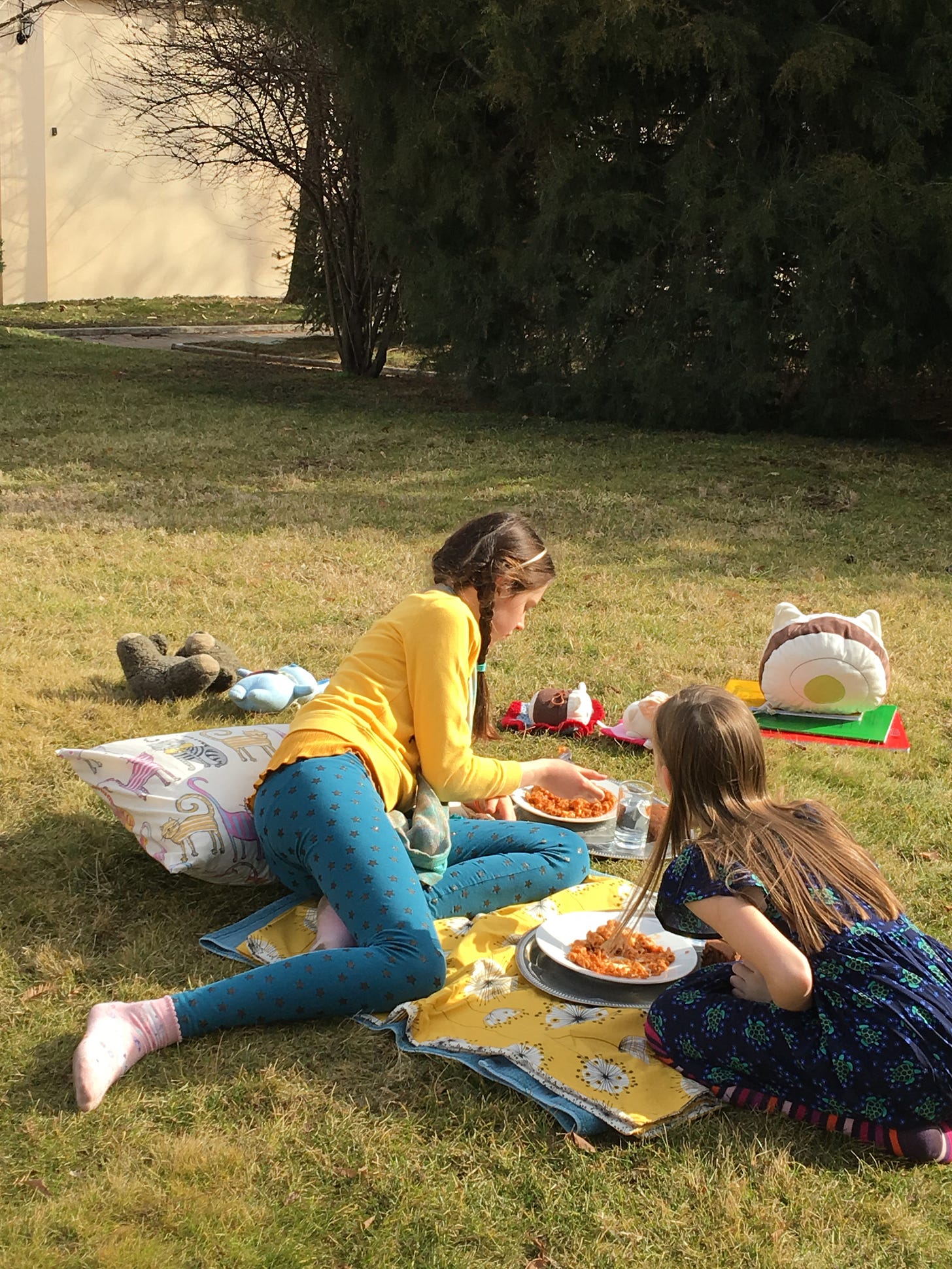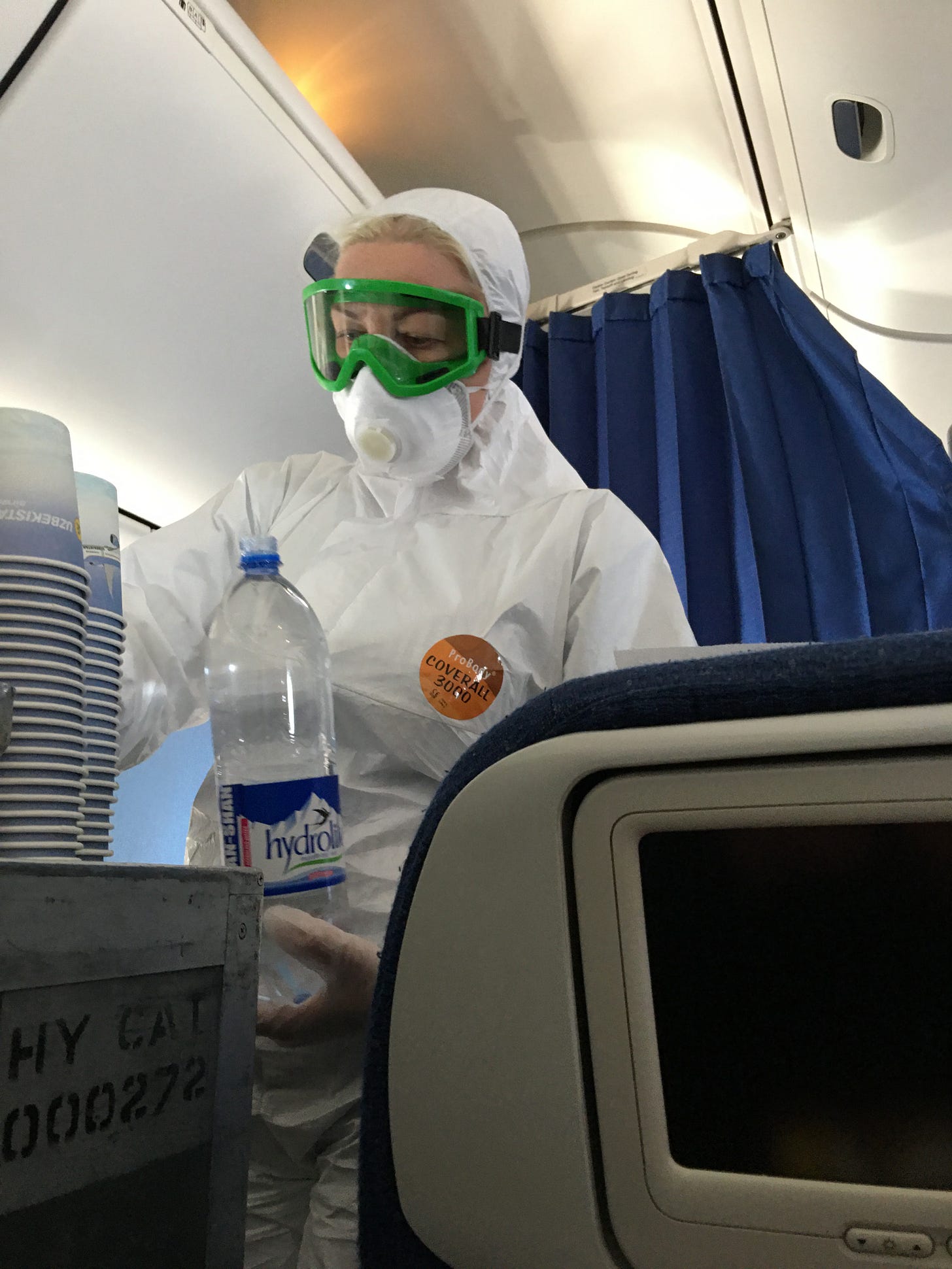The Separations, Part Three: This time it's covid's fault
Even before covid hit Uzbekistan, the British Foreign and Commonwealth Office evacuated all dependents. Theadora and I were sent to London—where we had nowhere to live—while Tim remained in Tashkent.
When I began writing about our separations, I thought they would take up just one post. But the more I write about them, the more I have to say. The more I realize how deeply these separations have affected our family. It may even be that these separations have been the most significant influences in our lives.
We were living in Uzbekistan when the longest separations began. In the years between Jordan and Uzbekistan we had managed to largely stay in the same country (Bolivia and England again), although both Tim and I traveled for weeks at a time for work and medical care.
In 2020, as you are all too well aware, the pandemic was starting. By March, the Foreign Office was worrying. While covid had not yet reached Uzbekistan, it was becoming clear that it would. China was not that far away.
We figured we could stay put. It would be easy to isolate ourselves in Tashkent, in our large house and walled gardens. But the Foreign Office had other ideas. When Tim told me that they were evacuating me and Theadora again, I literally stamped my foot. “I refuse!” I said. “I absolutely refuse to go.”
“Sweetheart,” Tim said gently. “I don’t think you can refuse.”
Theadora took the news even harder. She would have to leave her best and only friend Héloise. The girls spent nearly every afternoon together, making a secret fort in the basement, moving their animals through imaginary worlds, running naked around the garden, eating entire trays of muffins. By the time we were allowed to return to Tashkent, Héloise and her family would have moved on to their next post.
“I won’t go. I refuse to go.” Theadora sobbed at the kitchen, tears falling into her uneaten muesli.
“Sweetheart,” I said. “I tried that already.”
We were not the only ones who had to go, nor were we the only ones who tried to refuse. Victoria (name changed to protect her privacy), third in command at the embassy, and her five-year-old daughter Sasha, were evacuated with us. Victoria wanted to stay behind. And Tim wanted to keep her. As first secretary political, she was definitely essential staff. But because all dependents were evacuated, and Victoria had no spouse to send away with her daughter, she had to leave too, essential or not.
“Sounds like discrimination against single mothers,” I said.
“Probably because it is.”
“Didn’t you try to keep her?”
“I tried to keep all of you. But the one point the FCO made that makes sense is that if any of you do get sick, you will at least have access to better healthcare in London.”
“That doesn’t actually matter unless there’s a cure.”
“You know better than to expect logic from the government.”
This, from a man who represented it.
Of the three of us, Tim was at the greatest risk. He was 62 and every winter he came down with such a bad cough that I made him sleep on the sofa. If he got sick while we were gone, who would look after him? What if we never saw him again? Because we had no home in London, I also wondered where we would go.
“You’ll go to France,” said Tim. “You can be in our house.”
The house in France was our only permanent home. We bought it in 2013 when Theadora was four, so that she would have something that didn’t change. We switched countries every few years, and worried that one day this would bother her.
The FCO, however, had other plans for us. As British citizens, we could not go to France; our evacuation package (rent, some money for groceries) required that we return to London. Where we had nowhere to live.
With two days notice and by extraordinary luck, a fellow author found us a flat in Belsize Park, a part of London we could never afford without the evacuation package. We didn’t look at photos or question the landlady; we had no other options. We didn’t even know how many bedrooms it had. We packed our suitcases while Tim and I discussed our wills. We hadn’t yet written them because we couldn’t figure out how to make them legal in three countries. We were too uncontained, too connected to too many places.
We were stuffing power cords and adaptors into our carryons when Theadora climbed onto the bed to give her daddy a plush bunny. “To keep you company while I’m gone.” It had a little heart sewn on to its chest with her name in red thread. Tim didn’t say anything, and when I glanced over at him I could see why.
He came with us to the airport, where we kissed goodbye through our masks. I thought how ridiculous it would be if that was our last kiss.
It would be eleven months before we returned.
As we climbed out of the taxi in London, applause and the banging of pots and pans broke out all around us. The neighbors were hanging out their windows and balconies, cheering. Bewildered, we wondered if our new landlady had organized this welcome.
Not until the next day would we learn that the applause had been for the beleaguered workers of the National Health Service. It happened every Thursday evening. We were mortified we had ever thought it was for us.
While Victoria heaved our overweight cases out of the boot and up the stairs—I was in a neck brace and not supposed to lift things—I took the girls in and started a bath before I even looked around. I was in a panic about germs. We had been on two long flights and wandered three large international airports. We had been so careful, avoiding food and drink we hadn’t brought with us, coating our hands with sanitizer, wearing masks. Still. Sasha sucked her thumb, which she would stick in her mouth—despite the sanitizer—after wiping it along the armrest of her seat, the floor, the tray table. Her mask was too large and kept slipping under her chin. She was going to kill us all.
While the water ran, I looked around. There was only one bedroom, but the flat had a library with floor-to-ceiling shelves overstuffed with books and hundreds of board games. The living room was large, with shiny wood floors, mantelpieces full of split crystals and Lego Star Wars characters, a record player. Given the size of the kind of flats normally available to us, I was in awe of the space.
We had hardly begun to explore when I noticed that Theadora had tucked her stuffed animals – the ones she had just dragged halfway across the world and left sitting on the floor of airplanes– into the clean sheets of the sofabed in the library, which we would share.
Panicked and exhausted, I threw them on the floor. How could you endanger us like that? Don’t you understand we could all die?
Theadora burst into tears. Hating myself, hating the world, I got the two girls into the bath. Though we had only ever seen each other in formal diplomatic attire, Victoria and I stripped down to our underwear and gathered up the girls’ clothing to stuff into the laundry machine.
The girls sat passively in the water, sobbing, until I lifted them out. I wrapped them in clean clothing and tucked them into our respective beds, where they instantly slept.
Victoria and I quickly developed a routine, rising at 5 am to work before the girls were awake. I made coffee while she got online to look for a grocery delivery slot. We were too afraid to go to a store. It was days before we secured a delivery, so we rationed food. Victoria had packed an entire suitcase with canned tuna, tomatoes, and beans, packages of pasta. The landlady, who lived upstairs with her husband and four children, left butter and eggs outside our door.
I worked while Theadora attended her one-hour Zoom classes on my phone, as I didn’t have an extra computer. Theadora had never been on a screen of any kind. I hadn’t realized screens would be so important. I had always thought of them as distractions from what was important. There was suddenly a lot Theadora needed to learn. After class, she was supposed to work alone for seven hours. “When they say school is going online, they really mean school is being dumped on the parents,” wrote a friend from Paris. Or the kids.
Theadora cried after every online Russian class, because she saw her best friend Héloise—still in Tashkent—on the screen and pined. I could not console her.
Tim called once a week. He would call more often if I asked him to, but I was always busy, with work on my doctoral dissertation, a book launch, essays, and looking after Theadora. When Tim told me how overwhelmed and behind he was at work, I said, “Me too. And I’m also raising a child.” But it was unfair of me to feel resentful. Tim could not have done anything differently. He was as trapped in Tashkent as I was in London. He was all alone. I at least had Theadora to hold.
In the afternoons, I walked with Theadora in circuits through Regents Park and Hampstead Heath. Their emptiness was luxurious. The golden light. London was so beautiful with no people.
Sometimes Theadora cried for our entire walk, wanting her father, wanting Héloise, wanting her room in Tashkent.
Neither I nor Victoria had any domestic talents. We cooked the simplest of meals: tuna and bean salad, pasta, curries. We took turns with the dishes and cleaning.
The dishwasher, microwave, shower drain, and laundry machine all stopped working in our second week. The people who could fix them were not working either. I borrowed a screwdriver from upstairs (our landlady left it outside our door), took the shower drain apart, removed a vast creature of hair and soap, disinfected the drain with vinegar, and screwed it back together. When it began to work again, I felt the most concrete sense of accomplishment I had felt all year.
When Theadora wasn’t doing schoolwork, she read. We had not brought any toys with us and I had no time for games. In her suitcase, Theadora had packed 47 stuffed animals and three changes of clothes.
The Sunday before Easter, the girls made drawings. Theadora baked lemon squares, which she presented on a fancy three-tiered dish she found in the kitchen and then decorated with strawberries. She did it all by herself, using a cooking video she found on the phone. To serve them, she dressed up in a yellow shirt and your red dress, to match.
Next week: Liminal in London, roadtrip to France




